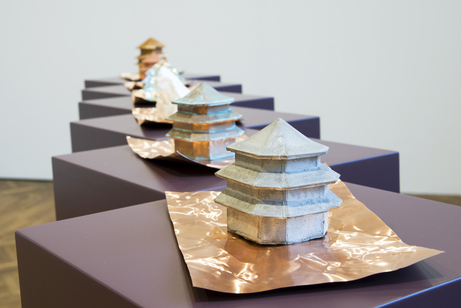-
today's events
Gallery and Bookshop Hours Chicago Architecture Biennial Jan 01, 2026 - Feb 28, 2026
-
upcoming event
-
past events
End-of-year Bookshop Sale Dec 13, 2025 - Dec 20, 2025
Eve Aboulkheir Lampo Performance Series Dec 06, 2025 Performance
Leila Bordreuil and Lee Ranaldo Lampo Performance Series Nov 08, 2025
Roc Jiménez de Cisneros Lampo Performance Series Oct 11, 2025
Concepción Huerta Lampo Performance Series Sep 27, 2025 Performance
Madlener House
4 West Burton Place
Chicago, Illinois 60610
Telephone: 312.787.4071
info@grahamfoundation.org

Aki Nagasaka, Project T, T for Taut, 2010
Taking its inspiration from Michael Rakowitz’s engagement with the work of an Armenian artisan and his Turkish pupil in the exhibition The Flesh Is Yours, The Bones Are Ours, this talk traces the intertwined stories of similar translations across time, space, and medium that end in Istanbul: the work of Armenian photographer Abdullah Frères during the Ottoman Period; the built environs of Turkish and German architects Sedad Eldem and Bruno Taut during the Early Republic; and the output of British and Japanese contemporary artists Victor Burgin and Aki Nagasaka. All the exhibitions, including the one on view at the Graham Foundation and the others that materialize in the lecture, perform unordinary acts of architectural history and preservation, bearing witness to the power of transversal dialogues against the absences created by historical violence.
Esra Akcan is associate professor in the Department of Architecture at Cornell University. She completed her architecture degree at the Middle East Technical University in Turkey, and her PhD and postdoctoral degrees at Columbia University. She has taught history-theory classes and architectural design studios at the University of Illinois at Chicago, Humboldt University (Berlin), Columbia University, the New School, Pratt Institute, and METU (Ankara, Turkey). Her awards and fellowships include those from the American Academy in Berlin, the University of Illinois at Chicago, the Institute for Advanced Studies in Berlin, the Graham Foundation, the Clark Institute, the Getty Research Institute, the Canadian Center for Architecture, the College Art Association, the Mellon Foundation, DAAD and KRESS/ARIT. Akcan is the author of the Architecture in Translation (Duke University Press, 2012), Turkey: Modern Architectures in History (Reaktion, 2012, with Sibel Bozdoğan), Çeviride Modern Olan (YKY, 2009), and (Land)Fill Istanbul: Twelve Scenarios for a Global City (124/3, 2004). She has guest-edited issues for Domus m (on globalization) and Centropa (on German-Turkish history), and coedited an issue for Nakhara (on writing Asian modernity). Her more than one-hundred published articles include writings on contemporary theory (critical and postcolonial theory, globalization); modern and contemporary architecture in West Asia; Ottoman architectural photography; established Euro-American architects’ engagement with the Gulf States; and the Middle Eastern diaspora in Europe.
Akcan’s scholarly work engages a geopolitically conscious global history of architecture, where her research on modern and contemporary architecture and urbanism foregrounds the intertwined histories of Europe and West Asia. Her book Architecture in Translation: Germany, Turkey and the Modern House offers a new way to understand the global movement of architecture that extends translation beyond language to visual fields. Advocating a commitment to a new culture of translatability from below and in multiple directions, it aspires toward cosmopolitan ethics and global justice. Her coauthored book Turkey: Modern Architectures in History contributes to a series that aims to produce an inclusive survey of modern world architecture, and is the first volume in any language to cover the entire twentieth century in Turkey. She is currently working on her next book on the urban renewal of Berlin's immigrant neighborhood, through which she explores a theory of open architecture.
Image: Aki Nagasaka, Project T, T for Taut, 2010.
For more information on the exhibition, The Flesh Is Yours, The Bones Are Ours, click here.
Copyright © 2008–2026 Graham Foundation. All rights reserved.